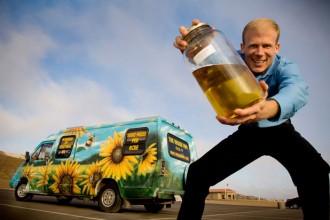Article by: Janine Erasmus
The introduction of new, lighter wine bottles for red and white wines will help the South African wine industry reduce its carbon footprint and impact on the environment.
Wine bottles have become increasingly lighter over the years – a mere four years ago a 750ml bottle tipped the scales at an average of 516g, and by 2009 it had dropped to 437g, but the new screw-capped bottles weigh in at just 350g each.
Cork-sealed bottles have also slimmed down, reduced in weight from 570g to 460g. The new bottles are expected to be available around April 2010, in time for the annual harvest.
The 370g bottle is the lightest bottle on the market at the moment and has already garnered a trophy for sustainability at the annual Gold Pack award ceremony, held by the Institute of Packaging South Africa.
Eco-friendly industry
South Africa’s wine industry has become steadily greener over the years. The introduction of a number of innovative eco-friendly initiatives has made it one of the most progressive industries in the world when it comes to saving the earth.
Among these are the Biodiversity and Wine Initiative, which is a partnership between the wine and conservation sectors, protecting precious indigenous flora in the species-rich Cape Floral Kingdom.
A number of wine estates have set up their own green projects, such as Backsberg, which is one of only a handful of winemakers worldwide that are carbon neutral, and which in 2008 launched its educational Earth Centre, also home to environmental NGO Food and Trees for Africa.
Hein Koegelenberg, CEO of Leopard’s Leap wines, which is known for its tireless conservation of Cape leopards, said: “We are extremely excited about the introduction of the lightweight bottles into our range. The introduction of lighter bottles into our wine collection is in keeping with our objective of being an eco-conscious wine brand and doing our utmost to limit our carbon footprint.”
Overseas success
South African wines are generally doing well overseas. In the UK the country is increasing its market share faster than any other competitor and to date has bagged 12.5% of that wine market, from 10.4% in 2008, according to internationally recognised market research company AC Nielsen.
Foreign exchange earnings from wine exports totalled over R6-billion (US$779-million) in 2008.
In the US the market share is much smaller but consumers there are looking for value for money in the aftermath of the global financial crisis, and South African wines, with their outstanding quality and wallet-friendly prices, are in growing demand.
South African wines have also made inroads in Sweden, where exports increased 18%, and Canada with an 11% increase. Other countries where local wine exports grew are Japan, Nigeria, Angola and China.
In 2009 the export of packaged South African wine grew 7% year-on-year, while export of bulk wine dropped by 18% to 150.5-million litres – in total 389-million litres of wine left the country last year.
Environmental impact
The wine industry takes a large toll on the environment. Not only does actual production have a substantial impact, but transportation of the finished product, often over vast distances, creates significant carbon emissions.
The new wine bottle is expected to reduce emissions simply by being lighter, resulting in lower fuel consumption. This smoothly addresses the problem facing the local wine industry in terms of increasing output and expert volumes while operating in a responsible manner.
“It becomes a delicate balancing act to enhance our sustainability profile while pushing up our output,” said Wines of South Africa CEO Su Birch.
Then why not supply overseas bottlers with wine in bulk and cut down transportation-related emissions in that way? Because, explained Birch, South African jobs would be lost – for every 10-million litres of bulk wine sent overseas, 107 jobs would be shed, and in the current economic climate too many have been lost already.
And taking into account that breadwinners have dependants, and associated services would also be affected, such a step would devastate many lives. Almost 276 000 people are currently directly employed by the wine industry.
Consumers, too, are doing their bit to save the planet. Many will choose an eco-friendly brand of wine over one that is less so, and savvy supermarkets and wine shops are eager to accommodate them.
Source: Media Club South Africa
The liveeco team



